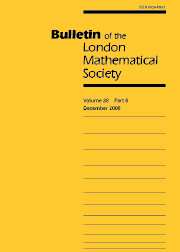Article contents
EIGENVALUES OF TOTALLY POSITIVE INTEGRAL OPERATORS
Published online by Cambridge University Press: 01 March 1997
Abstract
It is known [10, 11] that if T is an integral operator with an extended totally positive kernel, then T has a countably infinite family of simple, positive eigenvalues. We prove a similar result for a rather larger class of kernels and, writing the eigenvalues of T in decreasing order as (λn)n∈IN, we use results obtained in [4] and [5] to give a formula for the ratio λn+1/ lambda;n analogous to that given in [3] for the case of a strictly totally positive matrix, and to the spectral radius formula
formula here
This may be regarded as a generalisation of inequalities due to Hopf [8, 9].
- Type
- Research Article
- Information
- Copyright
- © The London Mathematical Society 1997
- 1
- Cited by


